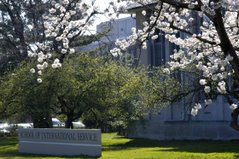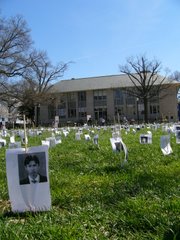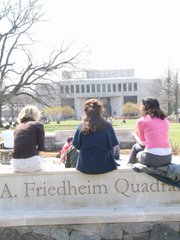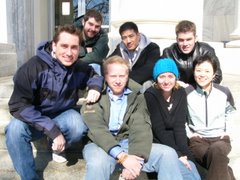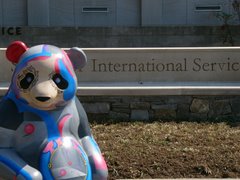SIS AUDIO LIBRARY
Tuesday, December 18, 2007
Active on the AU Campus and in Washington D.C.
My name is Leslie and I'm a second-year grad student at SIS, focusing my International Politics degree on Human Rights and Global Environmental Policy. Many of you probably saw all the news coverage about the protests in Burma earlier this fall. But what you likely didn't see was all the activist work that goes on behind the scenes here in DC. I've been fortunate enough to become involved in the Free Burma movement at AU, and I'd like to share some of that with you.
Like most activist causes, the Free Burma movement relies on a core group of focused, motivated, and dedicated individuals. From the annual student-led Alternative Break trips to the Thai-Burma border learning about the social justice aspects of Burma, to the Student Campaign for Burma here on campus that is composed of both graduate and undergraduate students, AU students have continually been at the forefront of campus and community Burma activism.
On campus, we "flagged the quad" to represent the 100,000 protesters in Rangoon and create a visual representation for the AU community (see more pictures on our blog). On the Hill, we filled a Senate hearing on the Saffron Revolution wearing tee shirts that proclaimed "UNSC Arms Embargo Now," and have alerted our campus community, friends and family to pass an important bill to shut down funding for the military regime. We helped to organize several protests at the Burmese, Chinese, and Indian Embassies which attracted several hundred individuals from DC and a good deal of media attention. We launched petition signing campaigns, film screening, speaker panels, and fundraisers for Burmese aid organizations. There are so many different ways to become involved, and I've had the chance to experience so many of them through my connections at American University and by being in Washington, D.C.
For more information on Burma activism at AU, please visit our blog at http://auburma.blogspot.com/, or email us at auburma@gmail.com .
Monday, December 10, 2007
Opportunities for Sudents to Publish
Today’s topic is our student-run journal, Swords and Ploughshares. The journal is an academic publication in the style of such periodicals as International Security and the Journal of Foreign Affairs. The articles are all written by students at SIS and Washington College of Law, and are typically refined pieces that were written for a class or for a research requirement. There is no central topic focus, other than the obvious international affairs theme. Anything within international affairs will be considered for publication. In recent issues we have published articles on various topics including international whaling laws and regulations; a comprehensive definition of terrorism; and the security of Russia’s energy sector.
I’m going to discuss two aspects of the journal as it relates to you, the grad student. First, Swords and Ploughshares presents you with a great opportunity for getting involved with something on campus. In the interest of full disclosure, I currently serve on S&P’s Editorial Board and as the Senior Copy Editor. It is not a paid job (wouldn’t that be nice…), but it can give you valuable experience in the publishing process that will serve you well on your résumé, especially if you are considering employment at a research foundation (a think-tank). Unless you are one of the senior editorial staff, the time commitment is relatively minimal.
Secondly, the journal is obviously a great opportunity to get your work published. We send out calls for papers at the beginning of every semester through the SIS listserv (I encourage you to subscribe to it) and also through “The Diplomatic Pouch”, our SIS newsletter. Submit something whenever you have a piece of work of which you are particular proud. The work you send us should be your very best. Don’t send us a rough draft or a paper you wrote overnight. Although we have editors, we want articles that exhibit a polished and professional writing ability. We have received articles in the past that contained potentially interesting subject matter, but were so poorly written that we had to decline them. The best way to ensure the professional caliber of your work is to involve a professor in the process. They can give you valuable insight into a research strategy, as well as helpful critique of your writing style and technique (remember, professors do this for a living). Don’t let your ego get in the way of improving your writing skills. Always have someone read and critique your work before you submit it for publication, and take their remarks seriously and objectively. Again, professors are the best source for this type of help. You won’t have to share authorship credit with them. All you have to do is thank them for their guidance in a footnote on the first page. Finally, it always helps to read the reputable journals in the field, such as the aforementioned. You’ll get a feel for what kind of style is appropriate for publication as well as how to structure a good argument. All this equates to better papers and, yes you guessed it, better grades in your classes!
So there you have it. Get involved and constantly seek to improve your skills as writer. I’m looking forward to seeing your submissions for future issues of Swords and Ploughshares.
Yrs. Truly,
Andy
“As in political so in literary action, a man wins friends for himself mostly by the passion of his prejudices and the narrowness of his outlook.” – Joseph Conrad
Monday, December 3, 2007
First Semester as an International Student

Today's SIS blog written by Gayatri Murthy,
As I begin my final week of my first semester here at AU’s School of International Service, it is easy for me to see that choosing to study International Communications at SIS was one of the best decisions of my life. As an international student, having lived my whole life in one place and never dared to move out of my comfort zone, I was eager to venture into new horizons, explore the world around me and challenge myself to the greatest extreme. And the School of International Service was all that and more.
My experience so far has been overwhelming. I feel as if I have been using only a small portion of my brain and every day in the International Communication program is a challenge. I can almost feel little neurons in my brain waking up to this vast pool of knowledge every minute. My classes make me think in directions I have never thought before. I felt a similar surge of emotions in my freshman year of college in India, when I was grappling with new concepts and ideas for the first time. At that time, I thought it was the spirit of being in college and just a passing idealist phase. But now I truly believe that ideas truly drive the world as we know it. As Churchill says, “"the empires of the future are the empires of the mind”, and I know this is the most ideal breeding ground for the best the world has to offer. Besides being this melting pot of divergent, yet interesting intellectual viewpoints, the most special quality at SIS is its sense of community. It is a forum for all voices, and the spirit of SIS encourages all these voices to co-exist and indeed, enhance one’s own intellectual growth. In my classes, or even in the Davenport, I have never encountered a brutal sense of competition, so typical of most professional schools. My transition as an international student couldn’t have been easier. I have met some of the most dynamic and diverse people here, whom I am proud to call my friends and I could not be happier to be right here at this point in my life.
On the flipside there are several underlying, yet complex themes to life as an international student. Since I came from an upper middle class, urban and English speaking background, I was lucky enough to not experience a great deal of culture shock or language barriers. But being far away from home, from one’s comfort zone makes you question your identity, your sense of belonging, the contribution of culture to your sense of being and myriad other questions which generally don’t have easy answers. As I count the days to Christmas break when I go back home (Bombay, India), I am once again filled with bittersweet feelings. I can not wait to go back home and yet a part of me feels at home in DC as well. Sometimes when you’re a foreign student, you run the danger of being out of context in all your contexts. As a student here, I constantly deal with explaining the origins of my points of views, and sometimes when I talk to friends and family back home; it becomes hard to contextualize all of my new experiences easily, in a way that they both truly understand me.
There are no solutions to this unique dichotomy and longing. But Grad school, for everyone alike, can be a quest to find one’s identity and it need not be a tiresome task. Instead, it can (and quite frankly is) the journey of a lifetime. You can’t hurry self discovery and a little patience makes the ride a lot more meaningful than the destination itself.
